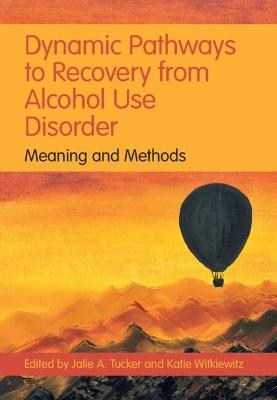
Dynamic Pathways to Recovery from Alcohol Use Disorder
Cambridge University Press (Verlag)
978-1-108-83871-9 (ISBN)
Alcohol use disorder is by far the most prevalent substance use disorder in the general population and is a major contributor to disease worldwide. Recovery from the disorder is a dynamic process of change, and individuals take many different routes to resolve their alcohol problems and seek to achieve a life worth living. Total abstention is not the only solution and robust recovery involves more than changing drinking practices. This volume brings together multidisciplinary research on recovery processes, contexts, and outcomes as well as new ideas about the multiple pathways involved. Experts chart the individual, social, contextual, community, economic, regulatory, policy, and structural influences that are vital to understanding alcohol use disorder and recovery. The book recommends new approaches to conceptualizing and assessing recovery alongside new avenues for research, community engagement, and policy that constitute a major shift in the practice and policy landscape.
Jalie A. Tucker is Professor of Health Education and Behavior and Director of the Center for Behavioral Economic Health Research at the University of Florida, USA. Her numerous awards include the Betty Ford Award from the American Medical Education and Research in Substance Abuse. Katie Witkiewitz is Regents' Professor of Psychology at the University of New Mexico, USA, and Director of the Addictive Behaviors and Quantitative Research Laboratory. She has received numerous awards, including a Presidential Citation from the American Psychological Association for early career contributions.
Preface; Acknowledgements; Introduction; 1. Historical and contemporary perspectives on pathways to recovery from alcohol use disorder Jalie A. Tucker and Katie Witkiewitz; Part I. Micro Level: The Individual as Change Agent: 2. Biopsychosocial process of change in alcohol use disorder recovery Katie Witkiewitz and Stephen A. Maisto; 3. The role of self-regulation strategies in recovery from alcohol use disorder Corey R. Roos, Sarah Bowen, and Hedy Kober; 4. Neuropsychological and biological influences on drinking behavior change Marsha E. Bates, Julianne L. Price, Jennifer F. Buckman; 5. Lifespan developmental perspectives on natural mechanisms of cessation of risky alcohol use and recovery from alcohol use disorder Matthew R. Lee, Yihong Zhao, Thomas Britton, Jenna Saviano, Kaan Kideys, Yimei Li, Colin Boulter, Emery Frick, and Kenneth J. Sher; 6. Mutual help approaches and mechanisms of change J. Scott Tonigan; 7. Time-Varying effect modeling to examine recovery outcomes across four years Ashley N. Linden-Carmichael, Samuel W. Stull, Christy K. Scott, and Michael L. Dennis; 8. Latent variable mixture modeling approaches to investigating longitudinal recovery processes JeeWon Cheong, Adam D. Wilson, and Juhan Lee; Part II. Meso Level: Understanding and Promoting Individual Behavior Change Within Natural Environments: 9. Natural recovery from alcohol use disorder: Patterns, contexts, and the behavioral economics of change Jalie A. Tucker; 10. Individual behavioral interventions to incentivize sobriety and enrich the natural environment with appealing alternatives to drinking James G. Murphy, Ashley A. Dennhardt, and Kathryn S. Gex; 11. Family and social processes in recovery from alcohol use disorder Amber M. Jarnecke, Delisa G. Brown and Alexander J. Melkonian; 12. Community-Based harm reduction approaches for alcohol use disorder Susan E. Collins, Seema L. Clifasefi, Grover 'Will' Williams, Lovella Black Bear and the LEAP Community Advisory Board; 13. Use of mobile technology to understand and improve recovery from alcohol use disorder Matthew R. Pearson, Noah N. Emery and Frank J. Schwebel; 14. Studying recovery in social context: A primer on methods for measuring and modeling social network data in applied recovery research Kevin A. Hallgren; 15. Measuring substance use contexts and substance-free reinforcement Ali M. Yurasek, Samuel F. Acuff and Meredith S. Berry; Part III. Macro Level: Creating Environments, Resources, Incentives, and Policies to Promote Harm Reduction and Recovery: 16. Recovery communities: Resources and settings David Best, Charlotte Hargreaves, Philip Hodgson, David Patton; 17. Disparities in alcohol treatment access in rural areas: Opportunities for change Claire Snell-Rood, Kara Bensley and Laura Schmidt; 18. Recovery, communities, and the organized recovery movement Robert D. Ashford; 19. Alcohol control policy and regulations to promote recovery from alcohol use disorder William C. Kerr and Meenakshi S. Subbaraman; 20. Causal inference approaches to studying recovery from alcohol use disorder Douglas Steinley; 21. Building on collaborative research to co-design SURE recovery, a mobile application for people with experience of alcohol and other drug problems Alice Bowen, Melanie Getty, Casandra Hogan, Paul Lennon, Elle Long, John Strang, and Joanne Neale; 22. Economic methods used to evaluate recovery programs for alcohol use disorder Brady P. Horn; Conclusions and Future directions; 23. Dynamic pathways to recovery from alcohol use disorder: advancing the scientific agenda and policy priorities Katie Witkiewitz and Jalie A. Tucker; Index.
| Erscheinungsdatum | 20.12.2021 |
|---|---|
| Zusatzinfo | Worked examples or Exercises |
| Verlagsort | Cambridge |
| Sprache | englisch |
| Maße | 175 x 250 mm |
| Gewicht | 950 g |
| Themenwelt | Geisteswissenschaften ► Psychologie ► Sozialpsychologie |
| Medizin / Pharmazie ► Gesundheitswesen | |
| Studium ► Querschnittsbereiche ► Prävention / Gesundheitsförderung | |
| ISBN-10 | 1-108-83871-5 / 1108838715 |
| ISBN-13 | 978-1-108-83871-9 / 9781108838719 |
| Zustand | Neuware |
| Haben Sie eine Frage zum Produkt? |
aus dem Bereich


